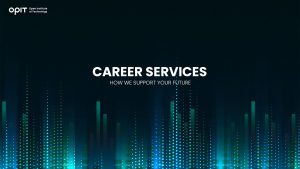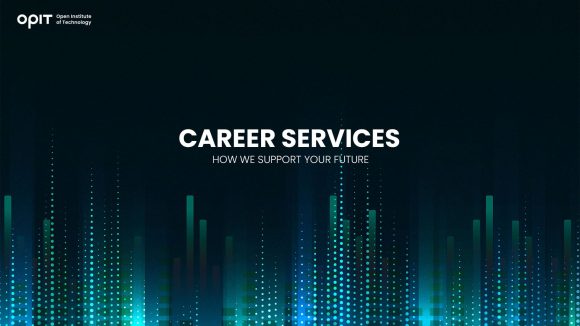

In May 2025, Greta Maiocchi, Head of Marketing and Administration at the Open Institute of Technology (OPIT), went online with Stefania Tabi, OPIT Career Services Counselor, to discuss how OPIT helps students translate their studies into a career.
You can access OPIT Career Services throughout your course of study to help with making the transition from student to professional. Stefania specifically discussed what companies and businesses are looking for and how OPIT Career Services can help you stand out and find a desirable career with your degree.
What Companies Want
OPIT degrees are tailored to a wide range of individuals, with bachelor’s degrees for those looking to establish a career and master’s degrees for experienced professionals hoping to elevate their skills to meet the current market demand.
OPIT’s degrees establish the foundation of the key technological skills that are set to reshape industries shortly, in particular artificial intelligence (AI), big data, cloud computing, and cybersecurity.
Stefania shared how companies recruiting tech talent are looking for three types of skills:
- Builders – These are the superstars of the industry today, capable of developing the technologies that will transform the industry. These roles include AI engineers, cloud architects, and web developers.
- Protectors – Cybercrime is expected to cost the world $10.5 trillion by the end of 2025, which means companies place a high value on cybersecurity professionals capable of protecting their investment, data, and intellectual property (IP).
- Decoders – Industry is producing more data than ever before, with global data storage projected to exceed 200 zettabytes this year. Businesses seek professionals who can extract value from that data, such as data scientists and data strategists.
Growing Demand
Stefania also shared statistics about the growing demand for these roles. According to the World Economic Forum, there will be a 30-35% greater demand for roles such as data analysts and scientists, big data specialists, business intelligence analysts, data engineers, and database and network professionals by 2027.
The U.S. Bureau of Labor Statistics, meanwhile, predicts that by 2032, the demand for information security will increase by 33.8%, by 21.5% for software developers, by 10.4% for computer network architects, and by 9.9% for computer system analysts. Finally, the McKinsey Global Institute predicts a similar 15-25% increase in demand for technology professionals in the business services sector.
How Career Support Makes a Difference
Next, Stefania explained that while learning essential skills is vital to accessing this growing job market, high demand does not guarantee entry. Today, professionals looking for jobs in the technology field must stand out from the hundreds of applicants for each position with high-level skills.
Applicants demonstrate technical expertise in relevant fields by completing OPIT’s courses. They also need to prove that they can deliver results, demonstrating not just what they know but how they have applied what they know to transform or benefit a business. Professionals also need adaptability, adaptive problem-solving skills, and a commitment to continuous learning. OPIT’s final Capstone projects can be an excellent way to demonstrate the value of newly acquired skills.
Each OPIT program prepares students for future careers by providing dedicated support and academic guidance at every step.
What Kind of Support Does Career Services Offer?
Career Services is specifically focused on assisting students in making the transition to the job market, and you can make an appointment with them at any time during your studies. Stefania gave some specific examples of how Career Services can support students on their journey into the career market.
Stefania said she begins by talking with students and discussing what they truly value to help them discover the type of career that aligns with their strengths. With students who are still undecided on how to start to build their careers, she helps them craft a tailored job and internship search plan.
Stefania has also worked with students who want to stand out during the job application process among the hundreds of applicants. This includes hands-on help in reframing resumes, tailoring LinkedIn profiles, and developing cover letters that tell a unique story.
Finally, Stefania has assisted students in preparing for interviews, helping them research the company, develop intelligent questions about the role to ask the interviewer and engage in mock interviews with an experienced recruiter.
Connecting With Employers
OPIT Career Services also offers students exposure to a wide range of employers and the opportunity to build relationships through masterclasses, career talks, and industry roundtables. The office also helps students build career-ready skills through interactive, hands-on workshops and hosts virtual career fairs with top recruiters.
Career Services also plays an integral role in connecting students with companies for their Capstone project in the final phase of their master’s program. So far, students have worked with companies including Sintica, Cosmica, Cisco, PayPal, Morgan Stanley, AWS, Dylog, and Accenture. Projects have included developing predictive modeling for natural disasters and fine-tuning AI to answer questions about EU tech laws in multiple languages.
What Kinds of Jobs Have OPIT Graduates Secured?
Stefania capped off her talk by sharing some of the positions that OPIT graduates have now fulfilled, including:
- Chief Information Security Officer at MOMO for MTN mobile services in Nigeria
- Data Analyst at ISX Financial in Cyprus
- Head of Sustainability Office at Banca Popolare di Sondrio in Italy
- Data Analyst at Numisma Group in Cyprus
- Senior Software Engineer at Neaform in Italy
OPIT Courses
OPIT offers both foundational bachelor’s degrees and advanced master’s courses, which are both accessible with any bachelor’s degree (it does not have to be in the field of computer science).
Choose between a BSc in Modern Computer Science for a strong technical base or a BSc in Digital Business to focus on applications.
Meanwhile, courses that involve a final Capstone project include an MSc in Applied Data Science and AI, Digital Business and Innovation, Enterprise Cybersecurity, and Responsible Artificial Intelligence.
Related posts

Source:
- Times of Malta, published on September 18th, 2025
4 min read
The gathering brought together academics and technology leaders from prominent European Institutions, such as Instituto de Empresa (IE University), OPIT itself and the Royal College of Arts, to explore how artificial intelligence is reshaping the university experience.
The OPIT AI Copilot has been trained on the institute’s complete academic archive, a collection created over the past three years that includes 131 courses, more than 3,500 hours of recorded lectures, 7,500 study resources, 320 certified assessments, and thousands of exercises and original learning documents.
Unlike generic AI tools, the Copilot is deeply integrated with OPIT’s learning management system, allowing it to track each student’s progress and provide tailored support.
This integration means the assistant can reference relevant sources within the learning environment, adapt to the student’s stage of study, and ensure that unreleased course content remains inaccessible.
A mobile app is also scheduled for release this autumn, that will allow students to download exercise and access other tools.
During examinations, the Copilot automatically switches to what the institute calls an “anti-cheating mode”, restricting itself to general research support rather than providing direct answers.
For OPIT’s international community of 500 students from nearly 100 countries, many of whom balance studies with full-time work, the ability to access personalised assistance at any time of day is a key advantage.
“Eighty-five per cent of students are already using large language models in some way to study,” said OPIT founder and director Riccardo Ocleppo. “We wanted to go further by creating a solution tailored to our own community, reflecting the real experiences of remote learners and working professionals.”
Tool aims to cut correction time by 30%
The Copilot will also reduce administrative burdens for faculty. It can help grade assignments, generate new educational materials, and create rubrics that allow teachers to cut correction time by as much as 30 per cent.
According to OPIT, this will free up staff to dedicate more time to teaching and direct student engagement.
At the Milan event, Rector Francesco Profumo underlined the broader implications of AI in higher education. “We are in the midst of a deep transformation, where AI is no longer just a tool: it is an environment that radically changes how we learn, teach, and create,” he said.
“But it is not a shortcut. It is a cultural, ethical, and pedagogical challenge, and to meet it we must have the courage to rethink traditional models and build bridges between human and artificial intelligence.”
OPIT was joined on stage by representatives from other leading institutions, including Danielle Barrios O’Neill of the Royal College of Art, who spoke about the role of AI in art and creativity, and Francisco Machin of IE University, who discussed applications in business and management education.
OPIT student Asya Mantovani, also employed at a leading technology and consulting firm in Italy, gave a first-hand account of balancing professional life with online study.
The assistant has been in development for the past eight months, involving a team of OPIT professors, researchers, and engineers.
Ocleppo stressed that OPIT intends to make its AI innovations available beyond its own institution. “We want to put technology at the service of higher education,” he said.
“Our goal is to develop solutions not only for our own students, but also to share with global institutions eager to innovate the learning experience in a future that is approaching very quickly.”

From personalization to productivity: AI at the heart of the educational experience.
Click this link to read and download the e-book.
At its core, teaching is a simple endeavour. The experienced and learned pass on their knowledge and wisdom to new generations. Nothing has changed in that regard. What has changed is how new technologies emerge to facilitate that passing on of knowledge. The printing press, computers, the internet – all have transformed how educators teach and how students learn.
Artificial intelligence (AI) is the next game-changer in the educational space.
Specifically, AI agents have emerged as tools that utilize all of AI’s core strengths, such as data gathering and analysis, pattern identification, and information condensing. Those strengths have been refined, first into simple chatbots capable of providing answers, and now into agents capable of adapting how they learn and adjusting to the environment in which they’re placed. This adaptability, in particular, makes AI agents vital in the educational realm.
The reasons why are simple. AI agents can collect, analyse, and condense massive amounts of educational material across multiple subject areas. More importantly, they can deliver that information to students while observing how the students engage with the material presented. Those observations open the door for tweaks. An AI agent learns alongside their student. Only, the agent’s learning focuses on how it can adapt its delivery to account for a student’s strengths, weaknesses, interests, and existing knowledge.
Think of an AI agent like having a tutor – one who eschews set lesson plans in favour of an adaptive approach designed and tweaked constantly for each specific student.
In this eBook, the Open Institute of Technology (OPIT) will take you on a journey through the world of AI agents as they pertain to education. You will learn what these agents are, how they work, and what they’re capable of achieving in the educational sector. We also explore best practices and key approaches, focusing on how educators can use AI agents to the benefit of their students. Finally, we will discuss other AI tools that both complement and enhance an AI agent’s capabilities, ensuring you deliver the best possible educational experience to your students.
Have questions?
Visit our FAQ page or get in touch with us!
Write us at +39 335 576 0263
Get in touch at hello@opit.com
Talk to one of our Study Advisors
We are international
We can speak in:
